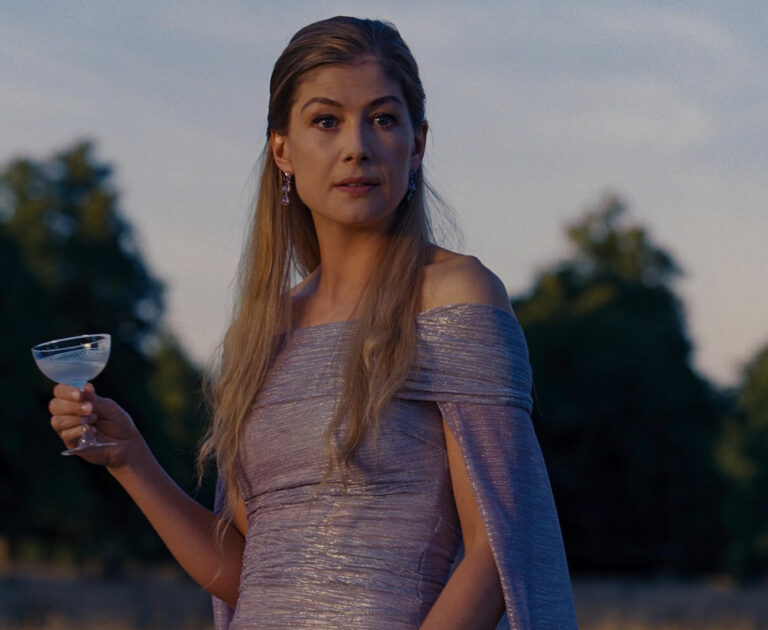
@Photo by Courtesy of Prime – © Amazon Content Services LLC
Synopsis : Academy Award winning filmmaker Emerald Fennell (Promising Young Woman) brings us a beautifully wicked tale of privilege and desire. Struggling to find his place at Oxford University, student Oliver Quick (Barry Keoghan) finds himself drawn into the world of the charming and aristocratic Felix Catton (Jacob Elordi), who invites him to Saltburn, his eccentric family’s sprawling estate, for a summer never to be forgotten.
Rating: R (Graphic Nudity|Drug Use|Disturbing Violent Content|Language Throughout|Strong Sexual Content)
Genre: Comedy, Drama, Mystery & thriller
Original Language: English
Director: Emerald Fennell
Producer: Emerald Fennell, Josey McNamara, Margot Robbie
Writer: Emerald Fennell
Release Date (Theaters): Wide
Runtime:
Distributor: MGM
Production Co: LuckyChap Entertainment
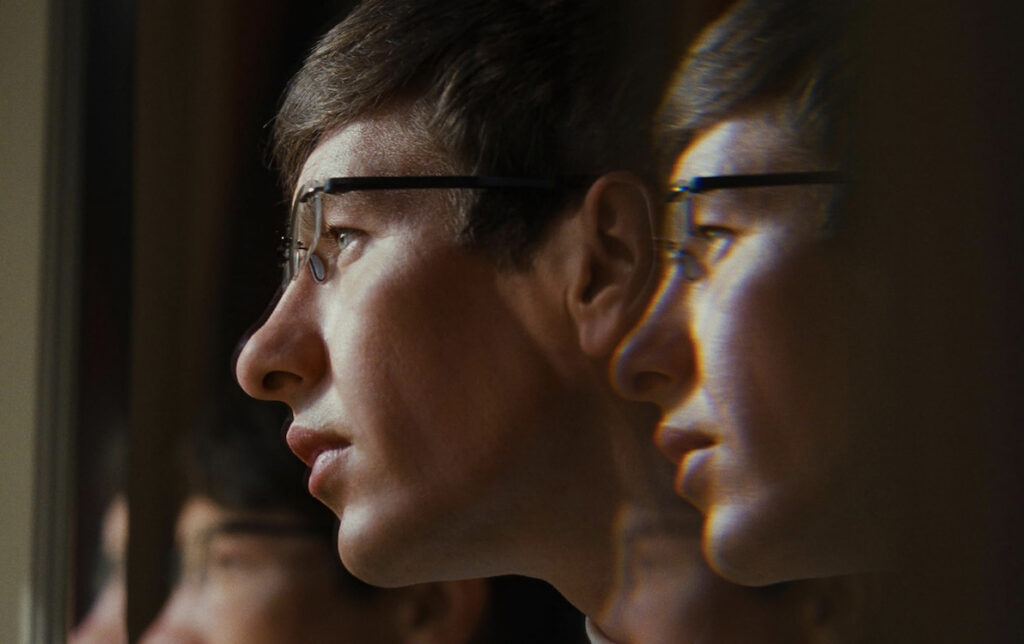 @Photo by Courtesy of Prime – © Amazon Content Services LLC
@Photo by Courtesy of Prime – © Amazon Content Services LLC
Press Conference with Actress Rosamund Pike
Q : You’ve been asked many times about your first conversations with Emerald and how that didn’t really prepare you for what was in store during the filming. I wonder if you could elaborate a little bit more about when you realized that this was going to go much further than you anticipated.
ROSAMUND: Well, my research for this role was quite intense. Because Elspeth does absolutely nothing. So, it was very important for me to clear my Dex. Go on vacation. You know, sit by a pool. Decide what swimsuit to wear. Order a few cocktails. And order some magazines. You know, on eBay. It’s not that easy from 2007. And read them. And sort of as Elspeth, think about all the people who are in the magazines who weren’t her. Because, her vanity knows no bounds. And that was preparation.
But it was when I came back from that vacation and landed in the house that we filmed “Saltburn” at, and I had opted to stay in the house itself. And I opened my curtains and there were the catering trucks outside. And I thought, oh, have I made a terrible mistake? Just like that line in the movie, many people get lost in “Saltburn.” Or, you’ll never leave. I was like, I’m never leaving.
‘Cause the grounds are huge and I don’t have a car. And I’m stuck here. And it was kind of mad and intense. But was a wonderful decision because the family were so generous. I had a bedroom in the house. I never saw all the rooms in the house. I mean, there were whole staircases I never even entered upon. Whatever you’re picturing as to the scale of this house, just quadruple it.
Q: I got to say, just these last few years, Rosamund, your work has just never been better. And that’s saying a lot. You know whether it’s “Radioactive” or “I Care a Lot.” And I’m just wondering, when you read Emerald’s screenplay for the first time, what was it about Elspeth that you saw in her? Like, how did you find your point of connection to embrace the outrageous vanity of this character?
ROSAMUND: Thank you for those lovely words. I think she’s a very unusual matriarch.
Because she’s almost completely disinterested in her own children. And in order to assuage that part of her that can’t really connect, she tries very hard to connect with outsiders because that’s a lot easier. Somebody who is disposable and can be asked to leave is a lot easier than committing to understanding your own family. So, she loves a kind of a case. A project. And Oliver Quick, played by Barry Keoghan, is the perfect project. Because he seems vulnerable, and he will benefit from her benevolent gaze.
And she will feel better about herself because she can play the benevolent goddess who astounds him. And bewitches him. And she loves nothing more than to bewitch someone. But at the same time, she doesn’t actually want someone to get too close. All these colors, I think, Emerald put in her script. As well as this person who’s sort of emotionally anorexic on some level that she starves herself of any real feeling.
So, when something very traumatic does happen to her, she’s so terrified of what would happen if she let it in, she just buries it. And I thought okay, that’s going to be a very interesting thing to play. There’s one thing where she can just not really look at something in the eye and smother it with social conversation. But it’s another thing when something really meaningful happens. And she has to behave in exactly the same way and carry on with the chit chat. That’s something I want to see and that’s something I want to play. So, I mean, it’s Emerald’s creation. I think I just sort of had to not get in the way of it.
Q : Was there a template for you in creating in Elspeth? Have you witnessed someone like her that helped you bring her to life?
ROSAMUND: I definitely have, Yes. You know, growing up in the UK, and at various times being in those sort of milieus, people who’ve made me uncomfortable. It was interesting. For all those times when I’ve been made to feel uncomfortable, it was a kind of payback.
The people who you don’t quite know what you’ve done wrong. But There’s something about you that doesn’t fit. So, to be on the other side of that, even you tell them you’ve done something. And they say, “How clever.” And you know that’s not a compliment. Even though it’s a nice word. And it should be nice. It somehow isn’t. You know, it’s that person. And I’ve seen it. And I’ve been around it. All the bizarre ways in which the English have this codified social behavior. And nobody tells you what the code is. But you certainly know when you break a rule.
But you don’t quite know what it is. But you’re aware that. By the folie a deux that descends that you’ve done something wrong. So, it was really fun for me to be kind of on the inside. Keeping people out.
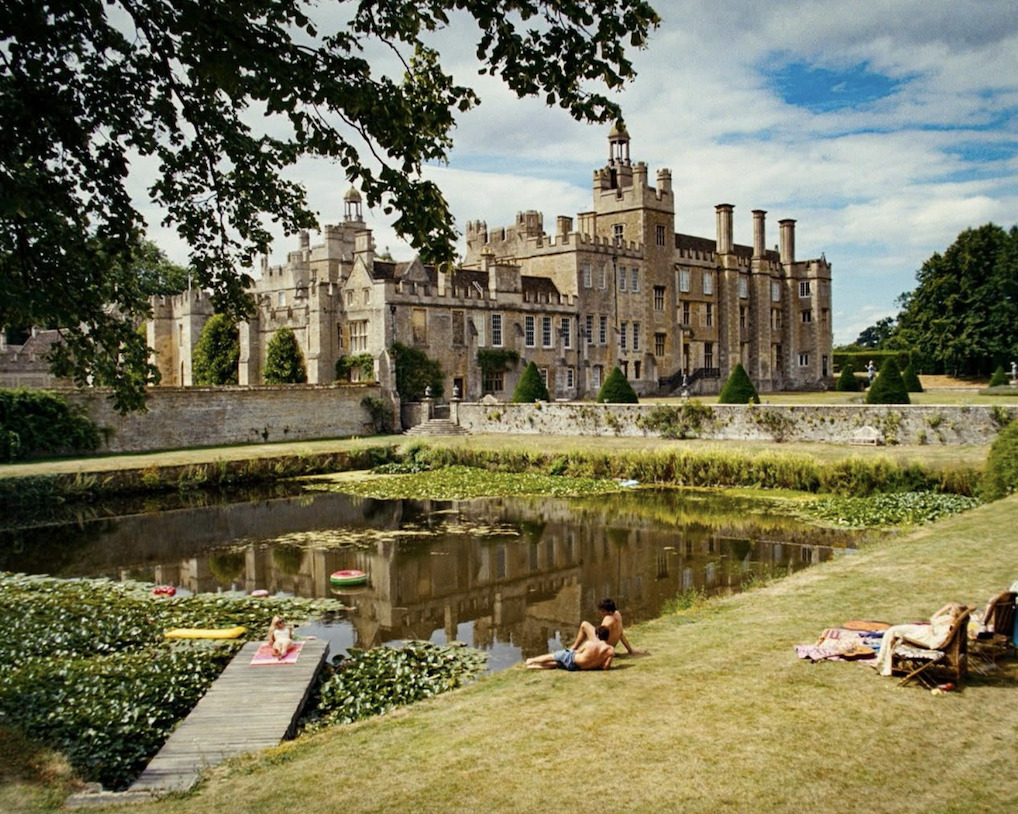 @Photo by Courtesy of Prime – © Amazon Content Services LLC
@Photo by Courtesy of Prime – © Amazon Content Services LLC
Q : You talk about Barry Keoghan, Gabrielle from Spain says, “How can you best describe Barry as an actor? What was it like to act with him in the film?”
ROSAMUND: Barry’s a maverick. He has so many different temperatures. And you never quite know what you’re going to get. And so, by the time we came to shoot the very, sort of, final bits of the film where Elspeth and Oliver have some time alone. But you’ll know what I’m talking about. I had seen other significant scenes of the film.
And obviously Elspeth is in a vulnerable position. And I thought I wonder what’s going to happen to Elspeth after. As this scene plays out. The camera keeps rolling. And Barry is so unpredictable. You just have to kind of let it happen. But it’s thrilling. It’s thrilling to work with. And we just, as a cast, we got on so well.
We all got on so well. We kind of had that feeling that we’d walk through flames for Emerald and do whatever she asked of us. And everybody had something interesting to do. You know, of equal weight. It’s a real ensemble. And we all played our part. And we all had a kind of ingredient, a specific flavor.
Q: I have to say, Rosamund, it is a terrific ensemble. And every character is so fully realized and so dynamic. And one actor I really also feel, in addition to you, has just been doing the best work of his career in more recent years is Richard E Grant. And I’m wondering, working with him, the volley that you have with him, you know, go off script and kind of improvise a little with him. What was it like with Richard E Grant?
ROSAMUND: [laugh] I was obviously thrilled when they said that Richard was going to be Sir James. I thought it was perfect. You know, everything from his hair to his eyes. I mean, one of my favorite moments of the film is just when this first scene Oliver comes in, and Richard and Jacob are watching “Superbad” together just in hysterics.
And I just find that so endearing. And it’s also exactly what you don’t expect the British aristocracy to be doing is sort of sitting in a kind of slightly disheveled armchair watching “Superbad.” But it’s pitch perfect. And he’s very funny, and very professional as well. He’s very punctual. It’s always good when you get the old heroes who come in and, show exactly how to behave. To younger cast as well.
Q : What elements from your own life did you draw upon to play this character?
ROSAMUND: I think I’ve touched on that already. Only that obviously 2006, 2007, which is the timeframe of the film, was just a couple of years after we made “Pride and Prejudice.” And I remember that era very well. I was kind of in magazines and stuff and would’ve been photographed out and about in London. And remembered kind of what a tough time it was for women. It was even more. Everybody was ready to catch, wanting to catch you falling out of a cab, hoping that you’d go to a premier looking great.
And then a few hours later they could catch you having had one too many to drink, with sweaty armpits. Or whatever it was that was just they were ready to shame women in such a big way. And that’s a kind of ingredient in the film. It informs Venetia, my daughter’s character. And even some of Elspeth’s lines about her own daughter. Her dismissive kind of impatience with her bulimia. And what she calls sexual incontinence is just flippantly thrown away. So judgmental. But that was the time. The time was incredibly judgmental. So, yeah. I mean, I lived through it. We all did, probably, on this call.
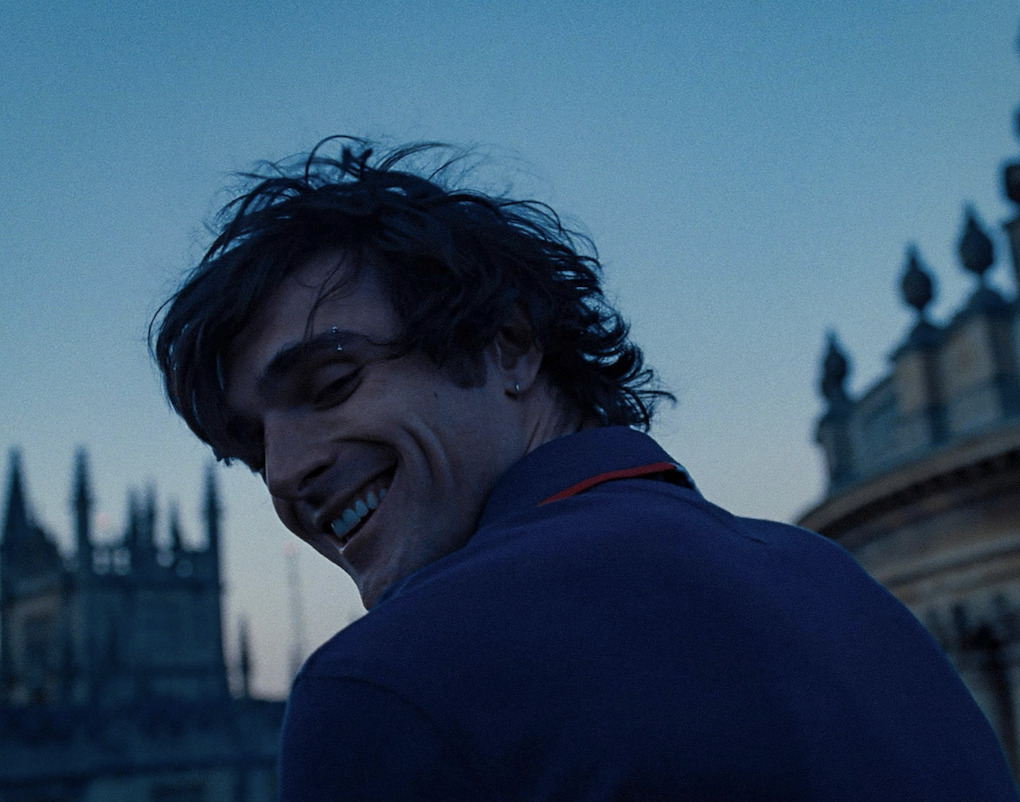 @Photo by Courtesy of Prime – © Amazon Content Services LLC
@Photo by Courtesy of Prime – © Amazon Content Services LLC
Q : You’re always throwing yourself so deeply into your characters. “Saltburn” has stayed with me since I’ve seen it. How long did it take you to shake off the feeling of this movie and playing this character after you were finished filming?
ROSAMUND: It takes a while, actually. And one of the weird things is because Elspeth doesn’t experience emotion in the way that film characters normally do, even though a kind of huge tragedy befalls her, that kind of went into my system in some sort of deep way. But you don’t get the normal outlet that you would in a kind of emotionally proficient kind of character, I suppose.
So, it was very surprising because a few months later we did ADR for the film. And Emerald needed me to redo the scream. Which we never see. Because Emerald has great respect for that kind of grief. But they needed to get a better sound quality on it. And I thought oh my gosh, how am I ever going to go back there.
And then I’m in a sound booth and all I had to do was remember that moment. And remember what she saw. And it was right there. So, that’s when you realize when a film’s got under your skin. Because scratch the surface and it’s still right there. That’s the really weird thing about our job.
Is how quickly you can be taken back. And it’s like this state dependent memory that I know people cleverer than I have written about. But it’s a really interesting thing. So, in answer to your question, they do linger around. I say, I just go home and cook the dinner. And I’m back to myself. But my partner definitely says that is not true.
Q : Well, I love promising a woman Emerald’s first.
ROSAMUND: Me too. I mean, she’s extraordinary. Everything she did on this film, the way she got every department on side, wanting to make this film for her, and do the best version of the film for her, I’ve never been a part of anything like it. Not like she does it.
Q : What is it about Emerald, Rosamund, that makes her such a great actor’s director?
ROSAMUND: I think it’s because you want into her world. Her brain. In the way that Oliver wants into Saltburn. Everybody around it. We want into her mind. You know who created this brilliant thing. And so, when she shares her mind, you just want in on it. You want to hear. You want to listen. And there were sort of lovely details. Do you remember there’s a scene where Elspeth is out having a drink with Oliver before everybody else has come down for dinner? And we were discussing what snacks would be there while they have their cocktail. And she said, “Well, it has to be Bombay mix.” Do you know what I mean?
I don’t know how Bombay mix goes around the world. But anyway, she said, “It has to be Bombay mix.” And she said, “Oh.” She said, “I think Elspeth would only be picking out the bits she likes.” So, I was like that’s brilliant. Okay. She’s the one who takes out the little green peas from the Bombay mix. And just leaves those kind of yellow sticks for everybody else. I thought, that’s Elspeth. I don’t need to hear anything more. That’s the best bit of direction. It’s that kind of specificity. Because actually that’s what you need. You need a little chink of light that can just illuminate everything.
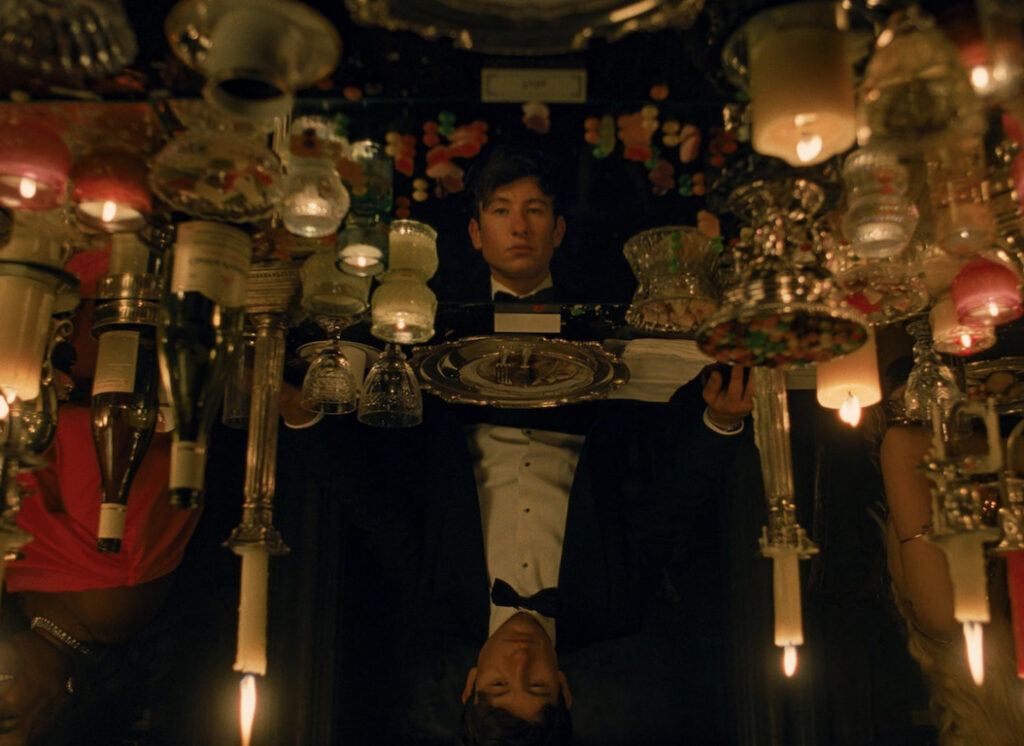 @Photo by Courtesy of Prime – © Amazon Content Services LLC
@Photo by Courtesy of Prime – © Amazon Content Services LLC
Q : Creating this cold, yet fake-loving family worked really to craft that kind of rich and elite world that Saltburn thrives in. But how did you collaborate with the cast? What did you do as a cast together to create that dynamic?
ROSAMUND: Well one thing is that Emerald insists that nobody goes off set into their own kind of world while we’re shooting. There’s no kind of retreating to a trailer or a dressing room or something. She wants everybody to hang out in the same space. So, we had a kind of sitting room in the house that was our green room. And everybody was there. You know, everybody. From the family to the guys playing the footmen, and Paul Rhys playing the butler, Duncan. Which is also a brilliant character. He kind of is the house.
He will remain forever unchanged. I think you can go back in 30 years and Duncan would be looking exactly the same. So, I think that’s one thing. And we laughed a lot. We just laughed. And we played games. And played cards. And played kind of silly word games. And my children were around.
Which is a great icebreaker for everybody. And so, they played with everybody. And just having sort of children on set, it takes your mind off things. And that was it really. You know, there was a very familial atmosphere. And we had great producers. Josey McNamara and Margot Robbie. They were around. And ever present. And you just felt that we were all making the same film. It was really.
Q : You know, one of my favorite scenes in the movie Rosamund, and it’s just because of this dynamic that, all these fully realized characters and the chemistry between you all. It’s sort of a simpler scene. But when you’re all having breakfast around the table. And all the cast is together.
ROSAMUND: Yes, all together. And yet, as you say, whoever asked the question. You know, everyone in their own world as well. So, it’s this curious thing where you’re comfortable, and companionable, and very at ease in one another’s company. But nobody really knows how one another is feeling. It’s a very odd thing in these families.
The same is when we did sort of little montage things of all of us one evening just watching “The Ring.” So, they put “The Ring” on the television, and that was it. We just sat and watched “The Ring.” There’s sort of, you know, with Elspeth, definitely not understanding, she would say, “I don’t understand.” Elspeth was probably falling asleep until that.
“Well, why is her hair like that?” “Where did she come from? From the television?” And, you know, the kids all screaming, and Sir James sort of laughing at it, and everybody’s reaction. Poor Dear Pamela, terrified. Terrified by the whole thing ‘cause it feels like her.
So, we kept having these things to do as a family that sort of brought us together, and we believe in. And even things like at breakfast. The caterers asking what everybody thinks their character would eat. Carey brilliantly saying, “I think she’d just be eating a little bit of marmalade on a spoon.” Of course. Exactly what Poor Dear Pamela would be eating. You know, Elspeth’d be having a boiled egg. Touching it probably. So, yeah, dinner. I love dinner scenes actually.
I really enjoy them because you kind of usually have to sort of settle in and be prepared to be shooting it all day. And the same with the wonderful Shepherd’s pie scene, which was obviously not at all fun to shoot. It was dreadful to shoot, but theatrical and brilliant because of the way Emerald conceived of it with the change of light halfway though. And the relentless way we had to go through everybody’s interior experience of that moment, you know?
Q : Could you please talk about Jacob Elordi, working together? And what did you know about him before you even started working with him?
ROSAMUND: Well, Emerald had said that she’d cast this incredibly handsome Australian. And I thought, “Well, how’s that gonna work?” And then she said, “No, no. He came in and he read, and it just blew us all away.” nd I still thought, “Yeah, but how is he going to capture, you know, the specificity of this English public school boy?” And then when I was in L.A., and I met him, and we went for lunch. I mean, it was kind of oblivious what a massive star he is.
So, of course, poor guy, we were constantly besieged by people who were kind of coming up to sort of talk to him. And he was very gracious and kind. But I realized in that meeting, I also wanted to know about his relationship with his mother, who I’ve later met. But I wanted to find out who he was. And I just realized in that meeting that he’s the real deal. That he’s a proper actor who puts the work in.
And I just saw it. You just ask a few questions, and you realize you’re dealing with the real deal. And what he does in the film is totally astonishing. I think he gets it as an English person. He gets it pitch perfect. It’s so brilliant what he does, especially not coming from that world. I just don’t know quite how he did it actually, in truth.
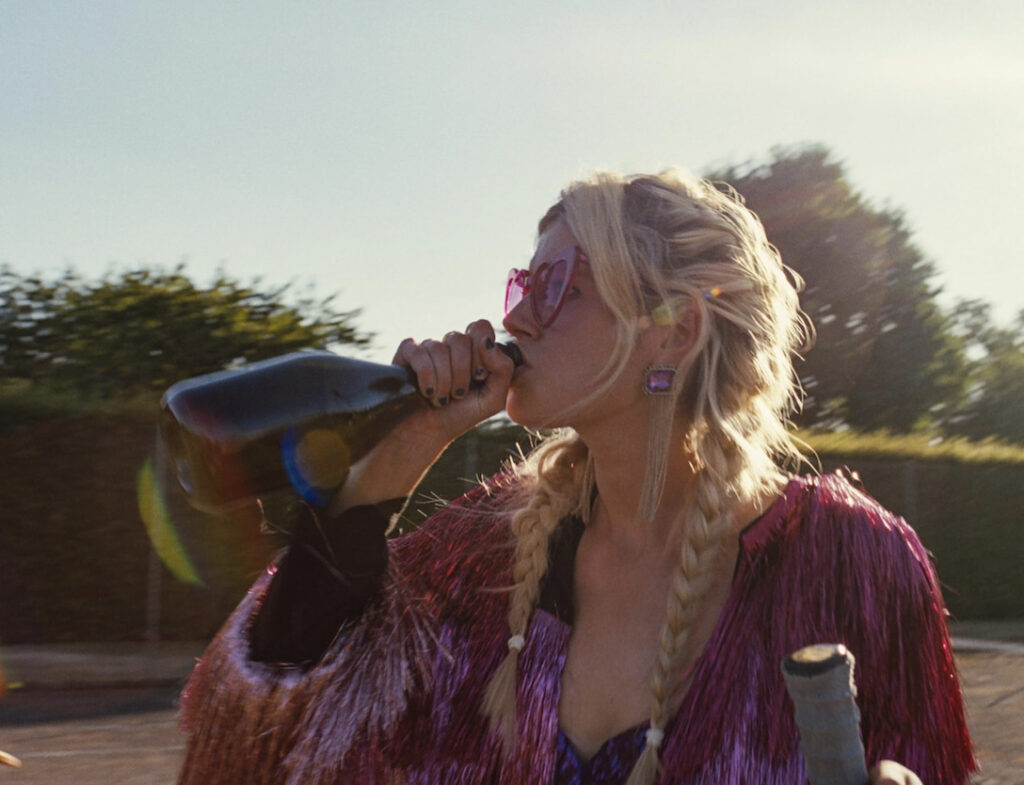 @Photo by Courtesy of Prime – © Amazon Content Services LLC
@Photo by Courtesy of Prime – © Amazon Content Services LLC
Q : It basically means phenomenal performance. He’s having an exceptional fall season, I have to say, too.
ROSAMUND: Yeah.
Q : What is the importance of Saltburn in regards to social commentary?
ROSAMUND: I think it’s Emerald’s musing on obsession and the way that we’re obsessed with what we can’t have. And I think the British aristocracy defines what we can’t have because however much money you make, or however you gain in social standing, what those families have in that house that’s been passed down generation through generation, you can’t have it.
And even if the family falls into, you’re an American businessman and you manage to buy an English stately home, you’re never gonna have what they have because it’s encoded in British life. And you’re not gonna get the same respect. You’re not gonna move in the same circles. It’s this mystifying thing that people can’t buy into.
And I think our current obsession with people on social media, of using Instagram to get inside places that we don’t have access to, you know, we’re doing it all the time. But obviously that’s not very cinematic, and Emerald has taken that obsessive nature that is kind of being engendered in all of us by the online world we live in.
And she’s sort of pinpointed it in 2006 in the British aristocracy, which is still a bastion that, yes, you can come through the doors, but you are never gonna belong unless you’re born into it. It’s cruel and sinister, I think. And having grown up in England, I know about it. I know you can get close, but if you’re not from it, you’ll never belong, you know?
Q : What was the best scene for you to play in the film? Your favorite moment making?
ROSAMUND: Well, the most fun were all the scenes where we were all together. I mean, I think probably the most fun was sitting with Carey talking, in a terribly disparaging and concerned way about the prospective, imminent arrival of Oliver.
And I think that was pretty delicious to do because we just laughed a lot in their kind of awfulness. And working with her again with that sort of sisterly way we have. We have a sort of deep connection even though we don’t see each other, you know, that regularly. That was really lovely. What else? I mean, the party scene was just incredible to witness because of the way Emerald conceived of it.
And the way the house was just trashed, and the way that the party was so extreme. I mean, even the extras, you know, started hooking up with each other. I mean, it was that kind of environment where you felt like anything could happen, and you almost forget you were making a film. It felt that you were at a kind of three-day festival or something.
To the point where, as Elspeth — I had finished my role because Elspeth was sort of retiring to bed. And then I went back to sort of the place we had for hair and makeup. And I saw this enormous, feathered headdress on the wall.
And I said, “You know what? I don’t think Elspeth would go to bed. I think she’d put that headdress on, put her dressing gown on, and go back [laugh] to the party.” So, that’s what I did. And there’s this shot where they’re kind of in the kind of cave, like, where they’re dancing to techno later in the night.
And you just see this kind of feathered headdress and these sunglasses, and that’s Elspeth kind of up by the DJ probably, you know? And I just felt that’s what she’d do. So, that’s what we did. It was, you know, there was the opportunity to kind of live it as well as act in it, you know?
Q : It sounds like you had a whole lot of fun making this movie.
ROSAMUND: Yeah, we did. But that’s down to Emerald, and Linus Sandgren who shot it so brilliantly. And Josey McNamara who’s a really astonishing producer.
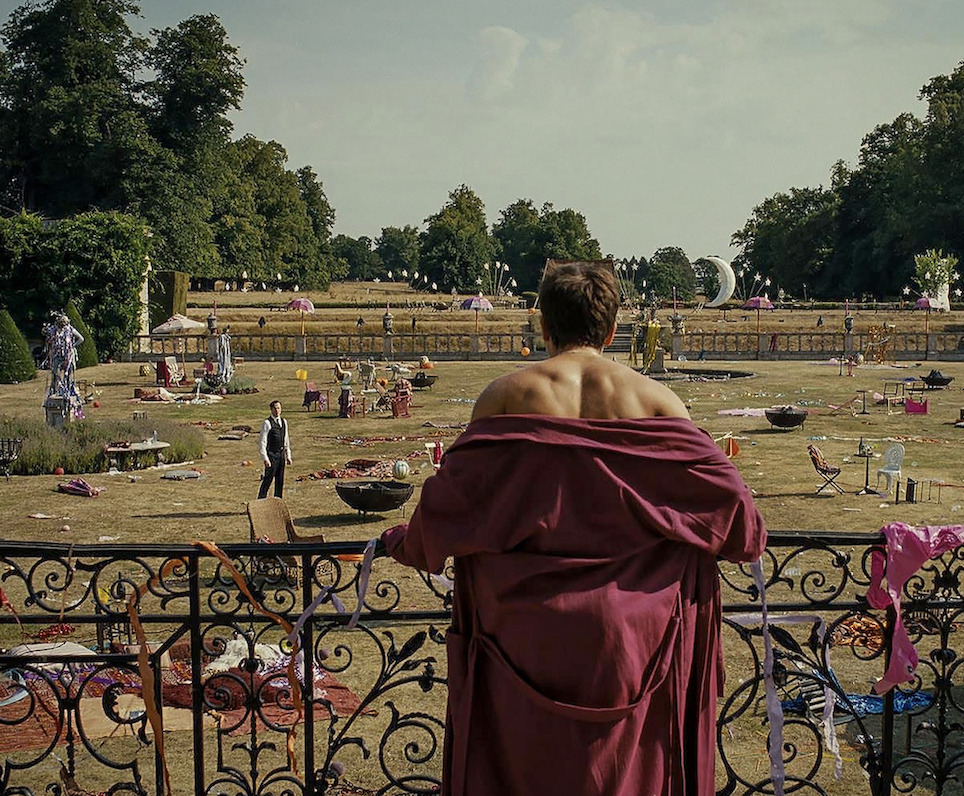 @Photo by Courtesy of Prime – © Amazon Content Services LLC
@Photo by Courtesy of Prime – © Amazon Content Services LLC
Check out more of Nobuhiro’s articles.
Here’s the trailer of the film.

